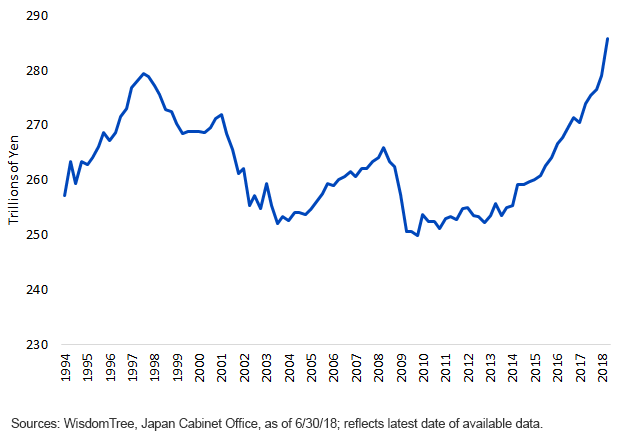Japan’s GDP: In the Sweet-Spot


Japan’s GDP report was a nice, positive surprise. Real GDP accelerated 1.9% in the April–June quarter, which was about half a percent better than consensus expectations. After the contraction in the previous quarter, this suggests an underlying growth rate of around 1% so far this year. This is right around Japan’s growth potential—fast enough for corporate profits to rise but not too fast to warrant changes in monetary policy. To wit: against consensus expectation for zero-earnings growth, the April–June corporate results season has delivered a 14% rise in profits.
Japan’s macro growth drivers were consumer spending and business investment. The former was driven by another smart acceleration in workers’ compensation growth—up 4.3% year-over-year between April and June, more than twice the 1.9% growth rate recorded in calendar year 2017. Last week’s report confirms that wage and income deflation has ended (see chart below).
Against this, the residential housing cycle shows no signs of reaching bottom. In fact, housing declined for a fourth consecutive quarter and now stands 9% below last year’s level. The still-deepening down cycle in housing is a key reason for why we think the Bank of Japan will not raise rates—housing is the most rate-sensitive sector in the economy, so raising rates would be pro-cyclical—i.e., raise recession risks.
Going forward, the immediate growth outlook is clouded by trade policy uncertainties (which could mean delays or cutbacks in capex plans) and supply disruptions forced by the recent flood damage and the current heatwave. More longer term, next year’s hike in the consumption tax and the expected fading of the 2020 Tokyo Olympic construction boom suggest downside risks to next year’s outlook. As such, we remain confident that monetary policy stays put for the foreseeable future.
End of Deflation: Japan’s Workers’ Compensation, Ytrn

Unless otherwise specified, all data sourced from Japan Cabinet Office as of June 30, 2018.


